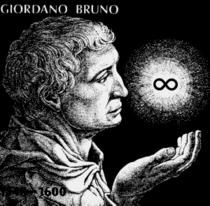| Monday, November 10, 2003 |
| Giordano Bruno, Renaissance Philosopher |
 My friend Lionel suggested I'd probably like Giordano Bruno, who's a now relatively little known Italian renaissance philosopher from the 16th century. At least I had never heard of him, but he's been very famous or infamous in various periods. My friend Lionel suggested I'd probably like Giordano Bruno, who's a now relatively little known Italian renaissance philosopher from the 16th century. At least I had never heard of him, but he's been very famous or infamous in various periods.
And, indeed, I like him. Here's a good overview of what he was about: The Forgotten Philosopher, which I'll include at the bottom too. He was apparently quite a bit ahead of his time, a pioneer semanticist and epistemologist. He wrote, for example, about the "shadows of ideas", about how ideas and words are always imprecise approximations of something more real. Like Korzybski centuries later, he took up battle against Aristotelian thinking that makes everything much too black and white. "This entire globe, this star, not being subject to death, and dissolution and annihilation being impossible anywhere in Nature, from time to time renews itself by changing and altering all its parts. There is no absolute up or down, as Aristotle taught; no absolute position in space; but the position of a body is relative to that of other bodies. Everywhere there is incessant relative change in position throughout the universe, and the observer is always at the center of things."He dreamt about an infinite universe with an infinite number of inhabited worlds, united in a single interpenetrating unity. A place where God and Nature couldn't possibly be considered separate entities. "The universe comprises all being in a totality; for nothing that exists is outside or beyond infinite being, as the latter has no outside or beyond."And he defended loudly the right to think about such things, to dream, to question reality, search for one's own answers, and to philosophize about what it all means. Which is summarized in the slogan he coined: "Libertes philosophica"Here is a list of his writings. Giordano was a major non-conformist thinker of his time. Which of course didn't sit well with the Catholic church. So, somebody inevitably turned him in to the Inquisition, which failed to make him recant in the slightest, and as a dangerous heretic he was eventually burned at the stake in 1600, as a martyr for free thinking and universal unity. [ Inspiration | 2003-11-10 15:59 | 6 comments | PermaLink ] More > |
| Innovation Futures |
| MIT Technology Review has introduced an experiment and game called "Innovation Futures". It is like a stock market where one can bet on the futures of all sorts of events, and you can buy and sell contracts. The events are real, but the money is not. However, the people who're most successful in the game will win some nice prices.
This is rather intriguing. Might something like this possibly be meaningful as a democratic mechanism? You know, if the game will reveal how much faith we have in various future scenarios, and who's the best at predicting which scenarios actually come to pass - does that not translate into something we can use to organize society by? Wouldn't the best leaders by those who are most in synch with public sentiments? I'm not sure if there's a correlation. After all, the 'real' stock market will rather reward those who can predict public mis-conceptions and profit from them, without much regard to the final outcomes. [ Information | 2003-11-10 16:43 | 2 comments | PermaLink ] More > |
| Cognitive Agent Architecture |
COUGAAR is an "Open Source Cognitive Agent Architecture for Large-Scale Distributed Multi-Agent Systems". Wow, that sounds neat. From that site:"Cougaar is a Java-based architecture for the construction of large-scale distributed agent-based applications. It is a product of two consecutive, multi-year DARPA research programs into large-scale agent systems spanning eight years of effort. The first program conclusively demonstrated the feasibility of using advanced agent-based technology to conduct rapid, large scale, distributed logistics planning and replanning. The second program is developing information technologies to enhance the survivability of these distributed agent-based systems operating in extremely chaotic environments. The resultant architecture, Cougaar, provides developers with a framework to implement large-scale distributed agent applications with minimal consideration for the underlying architecture and infrastructure. The Cougaar architecture uses the latest in agent-oriented component-based design and has a long list of powerful features."Sounds good. I'm very interested in self-organizing agents, and this is open source. Can I use it for anything? There are some documents. The architectural overview seems to be in clear enough language. I can't quite grasp if this only makes sense for a large logistical planning operation. Like if I'm going to invade Syria and I want the right number of M1 tanks to show up in the right place at the right time, despite that they, and various other pieces of hardware they depend on, come from a variety of different places, and I suddenly change my mind while the tanks are on their way, and btw some of them got blown up on the way, and so did some of the computers keeping track of this, but I want it all to work anyway. Is a similar framework meaningful for a more peaceful grassroots purpose? Such as the distributed storage of good information. Or collaborative planning of events or projects amongst diverse collections of organizations. [ Programming | 2003-11-10 17:37 | 0 comments | PermaLink ] |